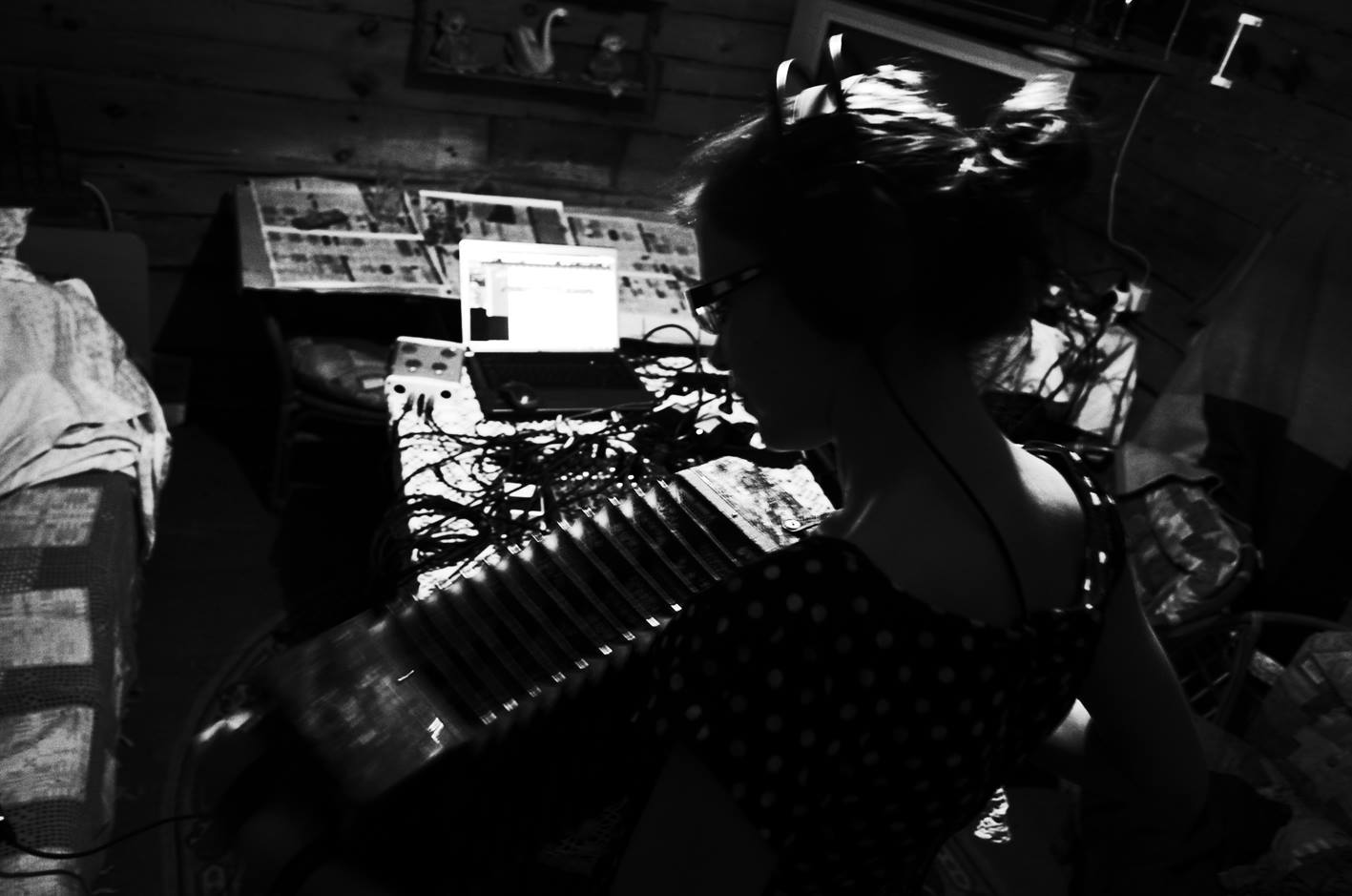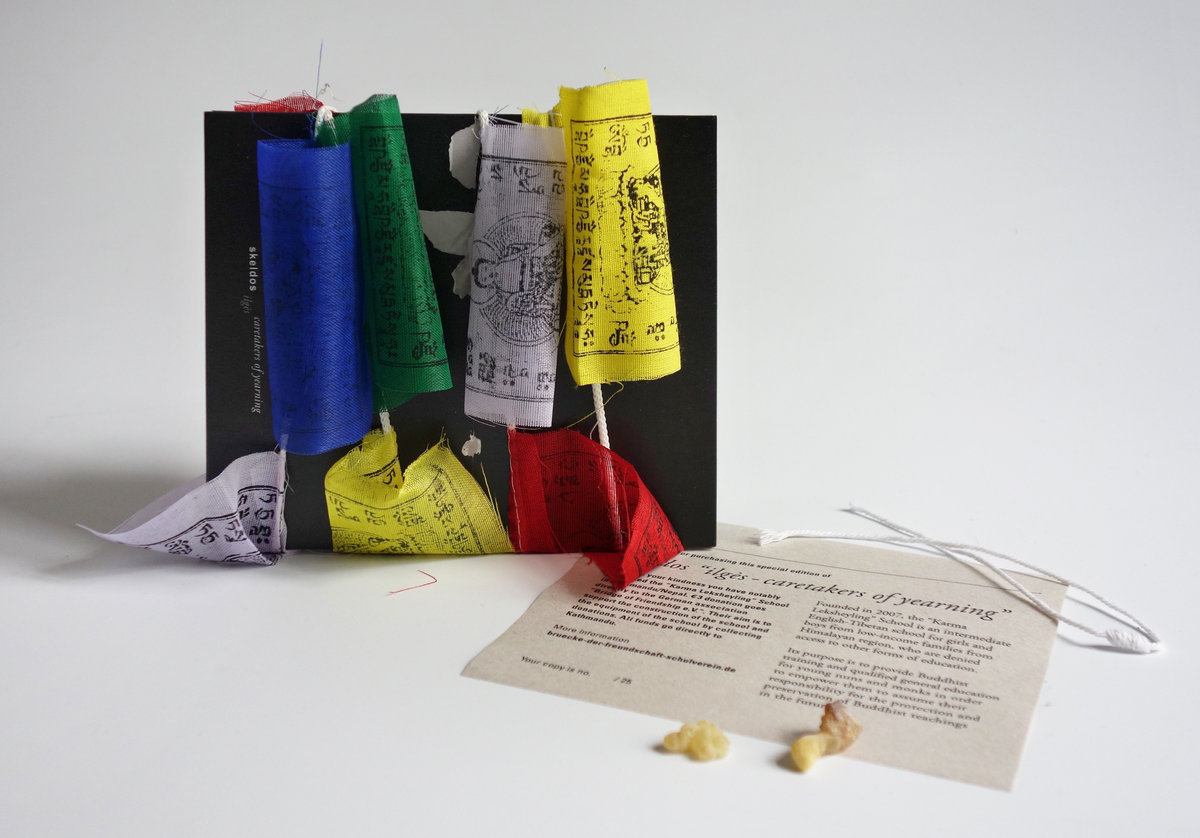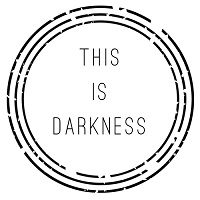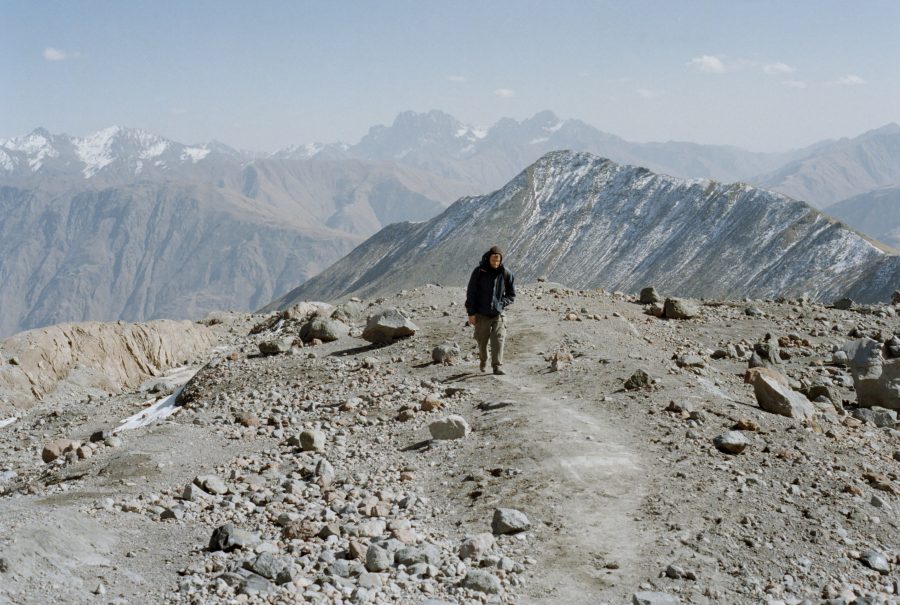Quick housekeeping: If you want to make sure you know about all new publications on This Is Darkness, the best way is to subscribe to our email list. You can do this by submitting your email address via ‘SUBSCRIBE TO BLOG VIA EMAIL’. You will find this in the right panel as you scroll down slightly. As Facebook is forcing people to spend more and more money for less and less coverage, this is becoming increasingly necessary!
I’ve been wanting to speak with Vytenis since I first heard Skeldos. His music has truly stood out to me from most of his contemporaries. There is an old feeling, ancestral and primal, which seems to emanate from his soundscapes. I hope you will all enjoy this interview and consider supporting the artist. He has some great work on his Bandcamp page, as well as a beautifully crafted recent release on The Epicurean. You can find links to both at the bottom of the interview!

Caucasus Mountains, Sakartvelo. 2016. Photo: Rūkana
Interviewer: Michael Barnett
Interviewee: Vytenis Eitminavičius (the man behind Skeldos)
Michael: Thanks for agreeing to this interview, Vytenis. Since your music was recommended to me around the cassette release of Ilgės, I’ve been wanting to pick your brain and find out more about this interesting project.
Vytenis: Hi, Michael. Thanks for asking for an interview. It’s a pleasure.
Michael: Had you been a musician in other bands/projects before this, or is Skeldos your first and only musical project?
Vytenis: I have been interested in music since childhood. One of the first instruments I started to play was a whistle called “the nightingale”. You had to fill it with water and then blow into it to make it sing like a bird. I remember trying to play with it in an orchestra rehearsal room. I was maybe 6. After almost 10 years I started to play trumpet in the same brass orchestra. But I have never really felt an affinity for the orchestral repertoire. Marches are not for me. So, one friend started to teach me to play the guitar. A few months later he suggested creating a band together. That is how Žvaigždumėnija was born. The name looks quite funny now, but the ambition was to join the words “Stars + Moon + Land”. We started to play music which was later attributed to the neofolk genre. We played some memorable shows in Lithuania and Königsberg. It was an important time for my personal growth.
When I was 20, I felt the need to record my own music. That’s how my first solo project, Beniūniuojant Nemiga, was born. The name means something like “Humming the Insomnia”. By the time Skeldos appeared, I had recorded 5 albums under this name. Maybe I’ll publish them online one day.
Michael: What made you decide to start this project?
Vytenis: Like with the earlier projects, the intention was to have a depository for my thoughts. A kind of personal sanctuary. A place which would always be there for me. It’s like medicine. Skeldos was born when I suddenly felt the need to play live and share with others. I realized the Beniūniuojant Nemiga project had to remain more intimate, something primarily for myself. Still, now I tend to think there is no big conceptual divide between the two projects. One simply concluded a stage in my life and the other marked a new one.
Michael: What genre would you classify your music as? Obviously, I cover dark ambient mostly. And this is music that will be agreeable to dark ambient fans. But in some ways I find it is outside that genre. Maybe an ambient folk with darker vibes or something?
Vytenis: I have never tried to make music that would fit within particular genres. I think I would lie if I said that my works are not influenced by the genres I love and listen to. But styles and genres have never been my goal. So far, I’ve heard different descriptions of Skeldos: drone-melancholia, contemporary folklore, post-industrial, ambient folk, as you say. I like all of them. All of these descriptions reflect something in the sound of Skeldos and are thus appropriate.
Michael: Do you remember when you first heard these obscure genres?
Vytenis: I was born in a small town called Utena. It was a time before internet became available in Lithuania, and we were mostly listening to pirated records bought in the market. When I was in 10th grade, a friend who taught me to play guitar introduced me to an album by Death In June. I listened to it and felt that almost all the music I had been listening to was total trash. These previously unheard sounds stimulated further interest. I realized there were so many things I did not know, and this unknown was full of great discoveries to come. Around the same time I learned about Dangus, a Lithuanian underground publishing and events collective. Whenever I had some free time during recess, I would go to the library to browse the Dangus.net website. That was how I discovered Lithuanian projects whose authors would later become my good friends. I consider that period my first acquaintance with dark ambient, post-industrial and other previously unfamiliar genres.

Skeldos + Daina Dieva performing “Aviliai” program live. 2014. Photo: Rūkana
Michael: You now have two solo releases as Skeldos, as well as a full-length collaboration with Daina Dieva, and the project IYv with Inga of Rūkana. Do you prefer working solo or do you find more creativity flows through collaborations?
Vytenis: The most important thing in creativity is the idea. As I have mentioned earlier, matching a specific musical genre is irrelevant to me. The idea and how to implement it with the help of sound is what matters. So, if a particular idea can be better implemented with other people, then collaborative work can inspire and enrich the creative process very much. But sometimes ideas are very personal and you need to implement them alone.
I would not give preference to any of the creative methods, I enjoy both solo and collaborative works.
Michael: Are there any albums or plans in the works with either of these musicians again? Or are you more focused on solo works for now?
Vytenis: I really hope we will dive into creative work with Inga and Daina again in the future. I would love to record more albums together or maybe play live again. For me, collaboration takes a close connection with the other artist. Shared work should not be mere genre games. A collaborative album should be something you could never produce on your own. Ideally, it is a dialogue between different artists, a seamless conversation of souls. Collaboration can help break out of your own limitations, but simultaneously it is a challenge, because an encounter of several artists is unthinkable without compromise. It does not have to be negative, though. In this case, it can serve as a niche for the emergence of the unexpected. To me personally the most interesting aspect of collaboration is how the finished album can differ from the initial sketches. If each one makes music without lying, it becomes strongly tied to the author’s emotional experiences. During the recording process, these experiences can change and trigger unforeseen flows in the album. It is one of the most intriguing things about collaboration.

Recording with Rūkana for IYv album “Upės”. 2015. Photo: Skeldos
Vytenis: Yet, often I want to assume responsibility for the whole thing, hence making solo albums is an equally important experience.
Currently, I am mulling ideas for several albums, both collaborations and solo releases. Upon releasing a new album, I often tend to feel a depressing void. Without thoughts, without sounds, without a safe place. Thus, I am happy to be thinking about those records which fill this void.
Michael: I must admit, I know Lithuania only by name and location. But I’m vaguely aware that your country has a thriving music scene. I wonder if you could first tell us a bit about your country, in terms of landscapes and culture, and how they interact with your style of music?
Vytenis: Sometimes I think that Lithuania’s greatest power lies in its simplicity, in a number of aspects. There are no big mountains here, but we love and cherish our hills. There is no ocean, but we have a bit of a seaside. Also, we have forests filled with stories, legends, our tears and thoughts we once confided in them. Sometimes I think that the saying “Lithuanian modesty” refers to power rather than weakness.
Lithuania remained pagan longer than any other European state. I believe that even today this is very much related to our desire to preserve the ancient traditions, songs, language… our land itself. I used to listen to a lot of Lithuanian folk music – I mean, the most archaic songs passed on by numerous generations. We have preserved a very distinctive song form called sutartinės. It is an ancient form of two- and three-voice polyphony based on the oldest principles of polyphonic singing. In sutartinės, individual singers repeat the same words and melodies with a certain delay, thus producing a kind of flowing, continuous vocal drone sound. I never wanted to use sutartinės directly in my music, yet I realize that the very principle of layering repetitive sounds to form a consistent sonic sea is very close to how I compose sounds.

Skeldos in Skeldos (a dead village in Lithuania). 2010. Photo: Rūkana
Michael: And the second part of this, how have your interactions with other Lithuanian musicians helped to mold the Skeldos sound? If they have at all.
Vytenis: My affinity with other musicians is based on various shared experiences rather than music proper. Although I could say that I met my best friends thanks to music, we rarely share our sounds in the course of work or talk about the creative process. It is a very personal thing that happens in solitude. In addition to the aforementioned projects, my friends behind the stage names Girnų Giesmės and Oorchach have probably made the biggest impact on the development of Skeldos. Our hikes, conversations by the fire, listening to the rustle of reeds in fall… Though we have our own paths in the sound plane, affinity with nature and trying to feel its interaction with the human is what unites us.
A quiet stopover during a hike amid pastel autumnal fields is the greatest communion and inspiration.
Michael: Skeldos includes some vocals, which often come in the form of sung/melodic poetry. Is writing and/or reading poetry an important part of your life, or something you focus on mainly as an element of Skeldos?
Vytenis: I have always been interested in different art forms: music, literature, photography, film, theater. Skeldos enables me to at least dip in all of them. For this reason, in addition to the sonic expression, I pay a lot of attention to the visual aspect of album covers/packaging or video projections accompanying my live performances.
My dad is a writer, so books and poetry have surrounded me all my life. Incorporating texts into my music adds an extra dimension, helping to communicate my thoughts more fully. Sometimes, the text is first to emerge in my head and the music will come later.

With friends by the fire, Lithuania. Winter. 2019. Photo: Skeldos
Michael: Do you consider your music to be part of some greater whole? Like a ritual? Or, is this something that should be taken casually, as easily digestible music?
Vytenis: I believe that music can outlast us. However, I would like to avoid pathos when speaking about my work. Sometimes it seems to me that the crucial things lie in our quiet thoughts, and the most important rituals are those we create ourselves.
I used to refer to my sounds as “anxious music”. Anxiety is a feeling which makes you focus and listen deeper. I never wanted to make music for background consumption. However, currently I also feel good when people tell me my music can soothe them.
Michael: Does incense play a part in the creation or live performance of your music? Would you recommend a certain incense or some other additional element to listeners, so they can fully appreciate your music?
Vytenis: The smell of a real bonfire smoldering in the woods at night is my incense. Even though traditional incense can also create an intimate atmosphere at home, it does not play a big role in my life. I would advise those who want to get the most out of the music of Skeldos to go to a forest in winter, put up a tent on the snow, make a fire, and just be silent for a while. It is a space which has left a lasting imprint on my inner world.

Baltic coast, Sweden. 2016. Photo: Rūkana
Michael: That is a very interesting answer! So, in order to fully appreciate Skeldos, one must first fully appreciate these activities in nature: the creation of fire, the smell of the smoke, the cold snow on your skin. These activities, done in silence, are as important to Skeldos as the music itself. And one may tap back into these experiences later in the comfort of their home, while listening to Skeldos.
Michael: You released your debut on Terror, a Lithuanian label. But, Ilgės – Caretakers Of Yearning (the re-mastered version of Ilgės which also includes a new third track), is the first album to be released on a more international label like The Epicurean. What are your feelings on this release through The Epicurean?
Vytenis: I feel happy to have received the offer from Stefan of The Epicurean to re-release an extended version of the album. I did not originally intend to re-release Ilgės, and never thought I would create a kind of follow-up for it. I had a great time keeping in touch with Stefan, everything went smoothly, and I am very pleased with our common result and the acquaintance itself.

The special edition CD set includes prayer flags, incense, refuge ribbon & certificate for donation on joss paper.
Michael: You work with a number of traditional acoustic instruments on your albums, including instruments like the accordion, Lithuanian zither, guitar and violin. Have you always been fond of traditional acoustic music?
Vytenis: I have always been fascinated by the possibility to make sound using mechanical means. Acoustic instruments fall into this category, together with the crackle of boats floating in a harbor or humming in the moonlight.
Michael: Do you have a proper “education” in any of these instrument types? Or have you learned to play them all yourself for the purpose of Skeldos sound-sources?
Vytenis: No, I have no musical education whatsoever. I can’t even read scores properly. When I played in the orchestra, I used to learn most of the works almost by heart, because I could only count the notes off from the “Do” or “Sol” notes.
When Skeldos came about, I felt an urge to reject VST instruments or sample banks, and instead try to generate my own sounds using live instruments, analog equipment, or field recordings as the primary source. Sure enough, later everything is inevitably processed by digital devices. I don’t want to say that I am against the use of software. What counts is the result, and everyone chooses their own path to it. It is simply more interesting for me to work this way.
Michael: I’ll end this on a properly dark note! What are your feelings on the state of our planet, as a whole? Will we make it another century, another 10,000 years? Or are we in self-destruct right now?
Vytenis: My thinking about the planet’s future is not optimistic. Whenever people think of themselves as supreme rulers, calamity is imminent. However, maybe I am a “small-scale” person, because I cannot bring myself to think thousands of years into the future. The feeling is much closer, and I can only hope that our little son will live his life in a calm enough world.
Michael: Thank you so much for your time, Vytenis! Also thanks to you all for reading to the end.
Vytenis: Thanks again for the invitation. And let music say more than these words can.
Skeldos Links
This Is Darkness’ reviews of Skeldos’ Ilges Original version / The Epicurean version
Official Skeldos Website
Facebook
Bandcamp
Latest release on The Epicurean


Leave a Reply